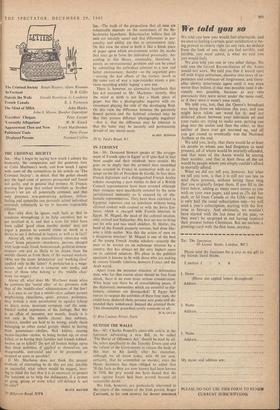The Criminal Society Renee Haynes. think Rosman.
In Ferment D. R. Cline Outside the. Walls Gerald Hamilton, G. Corderoy French Canada R. S. Potterton The Mind of MRA John Marks,
John S. Moore, Bamber Gascoigne
Travellers' Cheques Peter Forster 'Unworthy Allegations' W. W. Knock Appeasement Then and Now Frank MacDermot Publishers' Costs Peter Gwen Displaced Persons Norman Collins
THE CRIMINAL SOCIETY
SIR.—May I begin by saying how much I admire the humanity, the compassion and the generous fury 01 Colin Maclnnes's work, and how much I agree with some of the contentions in his article on 'The Criminal Society': in detail, that the police should pay the legal costs of persons prosecuted and found not guilty, and in general that (witness St. Francis greeting the gang that coshed travellers as 'brother thieves') we are all potentially criminal, and that only personal, non-patronising patience, fellow- feeling and sympathy can persuade actual individual criminals voluntarily to try to become responsible citizens. But—why does he ignore such facts as that to condemn wrongdoing is to help ourselves hot to get involved in it, and that a taste for what have been called 'good clean. murder stories' may not argue a passion to commit crime so much as a desire to see it defeated in fantasy as well as in fact?
Above all, why this extraadinary obsession with class? Some prisoners--murderers, persons charged with large-scale fraud, homosexuals. political demon- strators--are just as likely to be drawn from the middle classes as from those of the manual workers. (Why are the terms 'proletarian' and 'working class' applied only to the latter? A proletarian is a wage- earner, and a worker is someone who works, and most of those who belong to the 'middle class' work for wages.)
Above all, what does Mr. Maclnnes mean when he contrasts the 'social ethic' of his prisoners with that of the 'middle-class' administrators of the law?
It is easy. to see that a middle-class culture pattern emphasising cleanliness, quiet, privacy, politeness, may irritate a man accustomed to squalor (cheap or dear), noise, incessant company and the unin- hibited verbal expression of his feelings. But this is an affair of „manners, not morals. Surely it is not only in 'the middle classes' that robbery, violence, murder are held to be wrong; surely those belonging to other social groups object to having their possessions—clothes, flick knives, roaring Motor-bicycles—stolen, to being beaten up, or even killed, or to having their families and friends robbed, beaten up or killed? Do not all human beings agree that these activities, if applied to themselves, are disagreeable, anti-social and to be prevented or stopped as soon as possible?
If Mr. MacInnes does not think the present methods of attempting to do this are just. sensible or successful, what others would he suggest, hear- ing in mind the fact that it is as necessary to protect the innocent as to help the delinquent, if a system of gang, group or even tribal self-defence is not to arise?


























 Previous page
Previous page